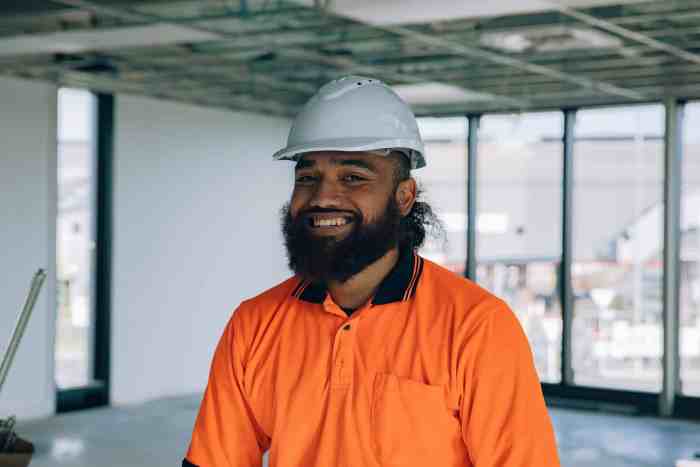MPTT Navigators will be beside you for every step of your journey into the trades. They’re ready to help you succeed in your pre-trades training, find your first job, settle into your apprenticeship and become a leader in your trade.
Each MPTT Navigator brings knowledge of the trades and insight into Māori and Pasifika culture. This equips them to understand you and help you find the right fit in employment – somewhere where you’ll have both opportunity and a sense of community.
Navigators will be there from the beginning
Navigators support trainees from the time they first start their course. And, of course, this means they can offer guidance on accessing your fee assistance and any other funding. Making the most of their knowledge of funding can be a game-changer.
Fawn Marsh studied towards her Level 4 NZ Certificate in Cookery at Kiwa. She was thankful to have support from her MPTT Navigator, Hami Chapman, who stepped in to help get her payments sorted.
“Hami gave me so much help. He organised a meeting with someone from Studylink to get everything sorted with my student allowance. I ended up getting paid that same week.”

Makahn Warren-Chapman, an MPTT Navigator, says she’s helped students understand their support options for things such as devices.
“There are a few schemes that can help students with devices. We support ākonga to get their application for those and fill them out. We also help push their applications forward. We know that often, our Māori and Pasifika students are kind of left on the outskirts and don’t know how to advocate for themselves. So, we do a lot of that.”
Navigators are your personal guide
MPTT Navigators offer personal guidance on your path into the trades. They’re ready to listen, so they can help you overcome any challenges and fulfil your aspirations.

Morrison (Morry) Pairama recently graduated from his pre-trades training in hairdressing. He has already secured his first role in a full-time position at Exile Hair and Design in Epsom. He says it was a great opportunity.
“It’s a great team, and I have beautiful, amazing clients. They love getting their hair done.”
Morris says the support from Naomi, MPTT Relationship Manager at MIT, was vital.
“She was always there if we needed her with anything, really.”
“I had quite a rough journey, and I needed to look after myself. But I could have utilised their support much earlier. Make the most of your Navigator; they’re there for a purpose. I wish I reached out more than I did, but I’m glad I got there in the end.”
Morris is now looking ahead to a bright future.
“I’d like to do my apprenticeship at Exile and then travel the world doing fashion shows. Eventually, I’d like to have my own business here in South Auckland – Otara will always be home.”
You’ll have a supporter for your study
Once you’re settled into your course, Navigators can help you stay on track and help you with study tips.
D’Troit Leef-Hema, who graduated as the MPTT outstanding scholar in Electrical Trades, says MPTT Navigators make you feel like you’re part of a family, even though you’re not related.
“My Navigator was like a big sister. She was always there keeping me in check, making sure I was going to my classes.”
He says the cultural understanding the Navigators brought is special.
“Navigators provide a lot of opportunities. It’s beautiful to have an organisation like MPTT that allows our Māori and Pasifika voices to be heard.”
He urges all MPTT tauira to make the most of the support Navigators offer.
“Don’t be afraid to take a risk and put your name out there – the worst that can happen is people say no.”
You’ll have help to get work-ready
MPTT Navigators help you get work-ready and develop soft skills that are essential in the workplace.
Makahn says, “One of the things we have identified is that people might not know how to write an effective CV, so we’ve developed a workshop that can assist with this. We also offer workshops about how to manage job interviews.”
Connections are critical
Networking for employment and apprenticeship is another critical area where MPTT Navigators make a significant impact. Your Navigator helps you understand how to make connections to secure apprenticeship opportunities and job offers.

Stormy Cruze Reihana has graduated from his pre-trades training in Plumbing, Gasfitting and Drainlaying at MIT. He says when he started out, he was trying to get into the trades on his own but then discovered MPTT scholarships and mentor support.
“Now, with what I know from my journey this year, I know it’s worth looking at your options. It can open up whole new pathways. For instance, we’ve visited Skills to hear about what they offer for apprenticeships, and there’s still more new information.”
MPTT Navigators are dedicated to the success of Māori and Pasifika learners in the trades sector. It means that in addition to funding, MPTT scholars have access to personal guidance, educational support, career development and networking.
If you’re ready to build a future in the trades, MPTT and its Navigators are here to help. Get in touch today to find out more.

















































